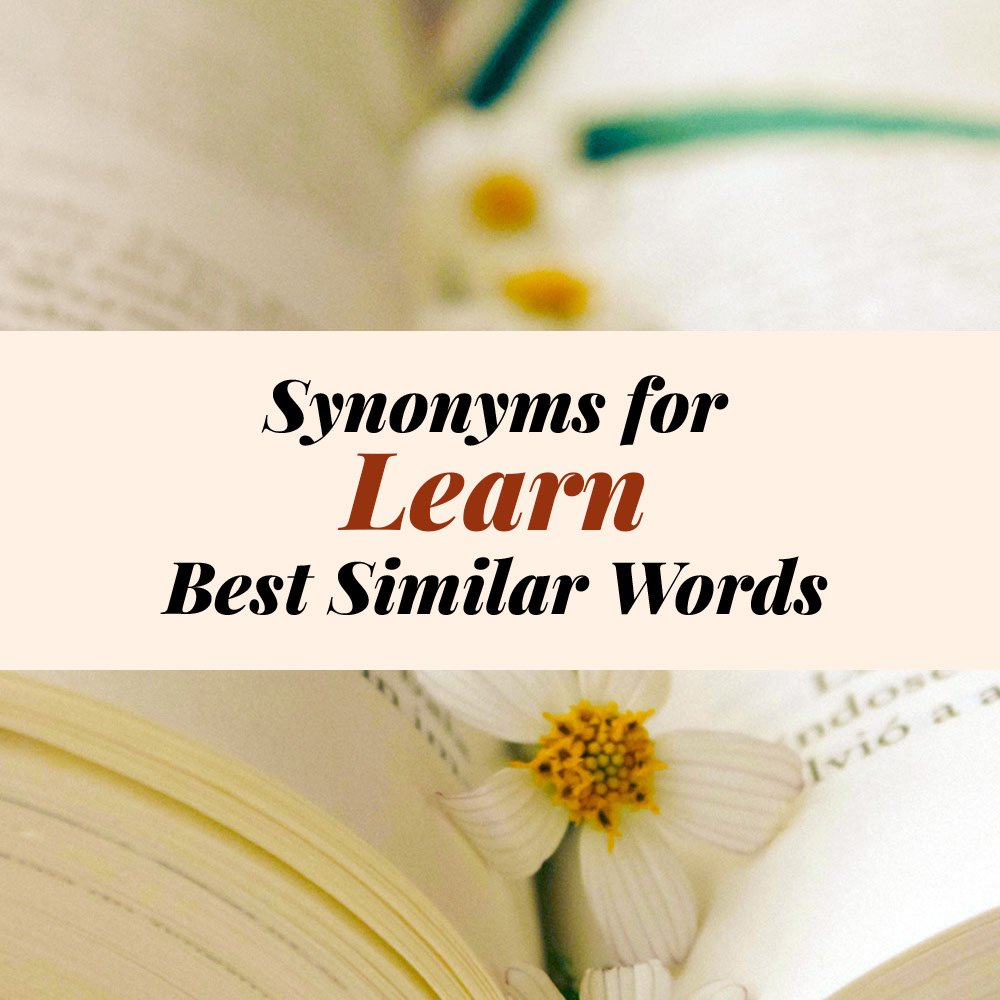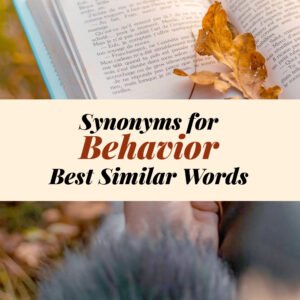Learning is an important part of growing and improving in life. It helps us gain knowledge, understand new ideas, and develop skills for the future. People use different words to express the idea of learning, depending on the context. Some common alternatives are study, master, and discover. In this article, we will explore 22 other ways to say learn, with clear explanations and examples that will help you understand each one.
| Synonym | Meaning | Example |
|---|---|---|
| Study | To read, review, or examine something carefully to gain knowledge | She studies math every evening to prepare for her exams. |
| Master | To become very skilled or knowledgeable in a subject or skill | He mastered painting after years of practice. |
| Discover | To find out something new or gain knowledge about something unknown | They discovered a new method to solve the problem. |
| Understand | To grasp the meaning or significance of something | He understood the instructions after reading them twice. |
| Grasp | To fully comprehend an idea or concept | She quickly grasped the main points of the lesson. |
| Comprehend | To mentally take in and understand something | It took him a while to comprehend the rules of chess. |
| Absorb | To take in information and make it part of your knowledge | Children absorb knowledge quickly when they are curious. |
| Acquire | To gain knowledge or skill through learning or experience | He acquired new coding skills by practicing every day. |
| Pick up | To learn something casually or informally | She picked up Spanish by talking to local people. |
| Memorize | To commit information to memory | Students memorize vocabulary words for their tests. |
| Train | To develop skills through practice and instruction | The athletes trained hard to improve their performance. |
| Educate | To provide knowledge or teaching | Parents educate their children about values and responsibilities. |
| Cultivate | To develop a skill, habit, or understanding | He cultivated his writing skills by reading often. |
| Explore | To investigate or examine something to gain knowledge | Scientists explore new areas of research every year. |
| Practice | To repeatedly do something to improve skill | She practices piano for an hour each day. |
| Review | To go over material again to reinforce learning | He reviewed his notes before the final exam. |
| Examine | To inspect or analyze closely to understand | The teacher examined the students’ work carefully. |
| Investigate | To look into something to learn more about it | The detective investigated the case thoroughly. |
| Instruct | To teach or guide someone in learning | The coach instructed the team on new strategies. |
| Observe | To watch carefully to learn or understand | He observed the experiment to learn how it worked. |
| Understand deeply | To fully grasp the meaning or significance of something | She understood deeply the importance of teamwork. |
| Engage with | To participate actively in learning or study | Students engage with projects to gain practical knowledge. |
22 Different Ways to Say LEARN: Another Word for LEARN
Study
Studying is one of the most common ways to gain knowledge. It involves reading, reviewing, or examining materials carefully to understand them. When you study, you focus on learning something new or improving your understanding of what you already know. Studying is useful for preparing for exams, understanding complex topics, or developing a skill over time. People can study alone or with others, and it can involve books, videos, online courses, or practical exercises. Studying regularly helps information stay in your mind longer, making it easier to use when needed.
- She studies history every evening to learn more about the past.
- He studies the map before traveling to a new city.
- They study math together to solve problems more effectively.
Master
To master something means to become very skilled or knowledgeable in a subject or skill. Mastery requires dedication, practice, and patience. It is not just about learning facts; it is about understanding them deeply and using them correctly. People often master skills like music, art, languages, or sports after consistent effort over time. When you master a topic, you can perform it confidently and solve problems related to it easily. Mastering something gives a sense of achievement and allows you to teach or guide others effectively.
- He mastered chess after practicing for years.
- She mastered cooking traditional recipes from her grandmother.
- They mastered programming languages through continuous learning.
Discover
Discovering is about finding out something new or gaining knowledge that you did not know before. It often involves curiosity, exploration, and investigation. Discovery can happen accidentally or through deliberate research and experimentation. When you discover something, it opens new possibilities and helps you understand the world better. Discovering knowledge can be exciting and motivating, as it often leads to new ideas and solutions. Both children and adults discover new things every day in different areas of life, from science to personal interests.
- Scientists discovered a new species in the rainforest.
- She discovered a new way to solve a difficult puzzle.
- He discovered his talent for painting in high school.
Understand
Understanding means to grasp the meaning, nature, or importance of something. It goes beyond just knowing facts; it is about comprehension and insight. Understanding helps you make sense of information and apply it in real situations. It can involve asking questions, thinking deeply, and connecting ideas. When you understand something, you can explain it to others, solve problems, and make better decisions. Developing understanding often requires time, patience, and attention to details.
- He understood the instructions after reading them twice.
- She understood the story better after discussing it with friends.
- They understood the reasons behind the teacher’s advice.
Grasp
Grasping is similar to understanding but often emphasizes the ability to fully comprehend an idea or concept. When you grasp something, it means you can mentally hold it and use it effectively. Grasping knowledge requires focus, thinking, and sometimes practical application. People often grasp new ideas faster when they see examples or practice using them. Grasping is important for solving problems, learning skills, and applying knowledge in real situations. It is a key step in the learning process.
- She quickly grasped the main points of the lesson.
- He grasped the concept of fractions after a few exercises.
- They grasped the rules of the game by watching others play.
Comprehend
To comprehend is to mentally take in and understand something completely. It often involves careful thought, reading, or listening. Comprehension is deeper than memorization because it allows you to connect ideas and use knowledge in different contexts. Comprehending information can take time, especially for complex topics, but it is very valuable. People who comprehend well can explain things clearly, solve problems, and make better decisions. Practice, questioning, and reviewing information help improve comprehension.
- It took him a while to comprehend the rules of chess.
- She comprehended the meaning of the poem after reading it several times.
- They comprehended the instructions for the project clearly.
Absorb
Absorbing means taking in information and making it part of your knowledge. It often happens gradually, especially when you are interested or curious about a topic. Absorption involves paying attention, practicing, and sometimes repeating actions or information. Children and adults absorb knowledge differently, but consistent exposure helps everyone learn more effectively. Absorbing knowledge allows you to use it in daily life and remember it for the future. The more you expose yourself to ideas, the more you can absorb and understand.
- Children absorb knowledge quickly when they are curious.
- He absorbed information from books and discussions.
- She absorbed the techniques of painting through observation.
Acquire
Acquiring knowledge means gaining skills or information through learning or experience. Acquisition is an active process and can involve practice, study, or real-life experiences. When you acquire knowledge, it becomes a part of your abilities that you can use. People acquire skills in school, work, hobbies, or personal interests. The process can take time, but it is rewarding because it builds confidence and competence. Acquiring knowledge is essential for personal growth and achieving goals.
- He acquired new coding skills by practicing every day.
- She acquired knowledge about gardening from her parents.
- They acquired communication skills through teamwork exercises.
Pick up
Picking up something means learning it casually or informally, often without structured study. It usually happens through experience, observation, or interaction. Picking up knowledge is common in everyday life, such as learning a new word, skill, or habit. It is a flexible way to learn and can be faster than formal study in some cases. People pick up skills by trying, observing, and practicing in small steps. This approach is especially useful for social, practical, or cultural knowledge.
- She picked up Spanish by talking to local people.
- He picked up cooking tips from his friends.
- They picked up new dance moves by watching videos.
Memorize
Memorizing is about committing information to memory so you can recall it later. It is often used for facts, dates, formulas, or lists. Memorization is useful when you need quick recall or when understanding comes after repetition. It can be done through writing, speaking, or using memory techniques. Memorizing also helps build a foundation for deeper learning, as repeated exposure makes the knowledge familiar. While memorization alone is not enough, it is a valuable tool in the learning process.
- Students memorize vocabulary words for their tests.
- She memorized the poem to recite it in class.
- He memorized multiplication tables to solve problems faster.
Train
Training is about developing skills through practice, guidance, and instruction. It focuses on building abilities that can be applied in real situations. Training can involve physical activities, mental exercises, or professional skills. It usually follows a step-by-step process to gradually improve performance. People train to become better at sports, work tasks, or hobbies. Consistent training helps create habits, improve efficiency, and achieve goals. Training also encourages discipline and motivation to keep learning.
- The athletes trained hard to improve their performance.
- She trained in piano for hours every day.
- They trained in coding through workshops and projects.
Educate
To educate someone is to provide knowledge, instruction, or guidance. Education can happen formally in schools or informally through life experiences. Educating involves teaching facts, skills, and understanding so people can apply them in life. Good education helps people think critically, solve problems, and make informed choices. Education is a continuous process that shapes personal and professional growth. People can educate others through teaching, mentoring, or sharing experiences.
- Parents educate their children about values and responsibilities.
- Teachers educate students about history and science.
- Workshops educate people on practical life skills.
Cultivate
Cultivating means developing a skill, habit, or understanding gradually. It involves consistent effort, attention, and care. Cultivation is important for personal growth, as it helps improve abilities and knowledge over time. People cultivate skills through practice, learning, and reflection. Cultivation also encourages patience and persistence because it takes time to grow strong abilities. Cultivating knowledge or skills ensures long-term improvement and allows you to reach higher levels of achievement.
- He cultivated his writing skills by reading often.
- She cultivated patience by practicing mindfulness.
- They cultivated teamwork skills through group projects.
Explore
Exploring is about investigating or examining something to gain knowledge. It involves curiosity, asking questions, and seeking new experiences. Exploration can be physical, like traveling to new places, or intellectual, like studying a new subject. Exploring helps expand understanding, discover new ideas, and gain practical skills. People who explore are often more creative and open-minded. Exploration encourages active learning and motivates people to continue seeking knowledge throughout life.
- Scientists explore new areas of research every year.
- She explored different art styles to improve her technique.
- He explored local culture while traveling abroad.
Practice
Practicing is repeating an activity to improve skill or knowledge. It is essential for mastering almost any ability, from playing instruments to solving problems. Practice helps information become familiar, builds confidence, and corrects mistakes. Regular practice is more effective than occasional effort because it reinforces learning and creates habits. Practicing also develops focus, patience, and discipline. People who practice consistently tend to achieve better results and retain knowledge longer.
- She practices piano for an hour each day.
- He practices solving math problems to improve speed.
- They practice speaking English to communicate fluently.
Review
Reviewing is going over material again to reinforce knowledge and understanding. It helps refresh memory, clarify concepts, and identify areas that need improvement. Reviewing can be done by reading notes, discussing with others, or testing yourself. Regular review strengthens learning and reduces forgetting. It is especially useful before exams, presentations, or important tasks. Reviewing also allows you to connect ideas and see the bigger picture, making your learning more effective.
- He reviewed his notes before the final exam.
- She reviewed her presentation to feel confident.
- They reviewed their project plan to ensure accuracy.
Examine
Examining means looking closely at something to understand it better. It involves careful observation, analysis, and thought. Examination helps uncover details, patterns, and relationships that are not immediately obvious. People examine problems, situations, or information to make informed decisions. Examining also improves critical thinking and helps in solving complex issues. Careful examination is a key step in learning deeply, as it allows you to fully understand a topic rather than just knowing it superficially.
- The teacher examined the students’ work carefully.
- He examined the report to find errors.
- She examined the experiment results to draw conclusions.
Investigate
Investigating is looking into something thoroughly to gain knowledge. It often involves asking questions, collecting information, and analyzing findings. Investigation is used in science, research, and problem-solving. It helps uncover truths, learn facts, and make decisions based on evidence. Investigating requires patience, attention, and curiosity. It encourages active learning and deeper understanding, as you seek to find answers rather than just accepting what you see.
- The detective investigated the case thoroughly.
- She investigated different learning methods to find the best one.
- They investigated the effects of climate change in their area.
Instruct
Instructing is teaching or guiding someone to help them learn. It involves explaining, demonstrating, and providing support. Instructors help learners understand ideas, develop skills, and apply knowledge. Effective instruction is clear, organized, and encourages participation. People can instruct in classrooms, workshops, or one-on-one settings. Instructing also helps reinforce the instructor’s own understanding, as teaching requires explaining concepts clearly. Good instruction motivates learners and builds confidence in their abilities.
- The coach instructed the team on new strategies.
- She instructed students on how to complete the experiment.
- He instructed his assistant in using new software.
Observe
Observing means watching carefully to learn or understand something. It is a way to gain knowledge without direct involvement. Observation helps notice details, patterns, and behaviors that can improve understanding. People learn by observing others, experiments, or natural phenomena. Observation encourages curiosity and critical thinking. It also provides practical examples that can be applied in learning and daily life. Observing regularly can reveal insights that are not easily found in books or instructions.
- He observed the experiment to learn how it worked.
- She observed skilled painters to improve her technique.
- They observed wildlife to understand animal behavior.
Understand deeply
Understanding deeply means fully grasping the meaning, importance, or function of something. It goes beyond basic comprehension and requires thinking, questioning, and connecting ideas. Deep understanding helps solve problems, make informed decisions, and apply knowledge in real situations. People who understand deeply can explain topics clearly, teach others, and see connections between different concepts. Developing deep understanding takes time, reflection, and effort but provides lasting benefits for learning and growth.
- She understood deeply the importance of teamwork.
- He understood deeply the causes of the problem.
- They understood deeply the benefits of healthy habits.
Engage with
Engaging with something means participating actively to gain knowledge or skills. It involves attention, practice, and interaction. Engagement encourages learning by doing, asking questions, and exploring ideas. People engage with projects, discussions, or activities to learn more effectively. Active engagement helps retain information, understand concepts better, and develop practical abilities. Engaging with knowledge also motivates learners because they feel involved and responsible for their learning progress.
- Students engage with projects to gain practical knowledge.
- She engages with online courses to improve her skills.
- He engages with team activities to learn collaboration.

Final Thoughts
Learning can be expressed in many ways, each adding a different shade of meaning. From studying and mastering to observing and engaging, every synonym shows a unique approach to gaining knowledge and skills. Using these words helps describe the process of learning more vividly and precisely.









